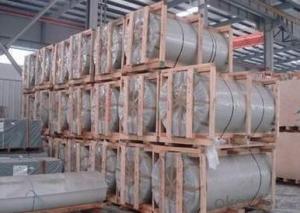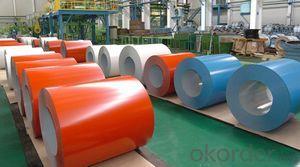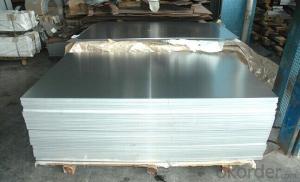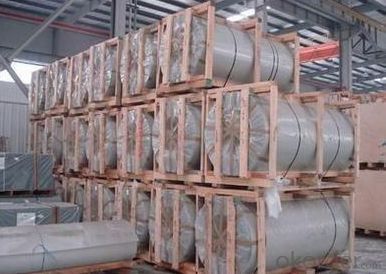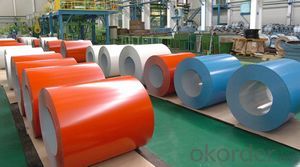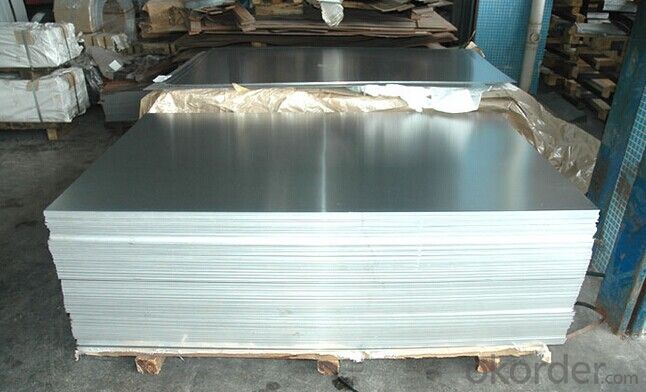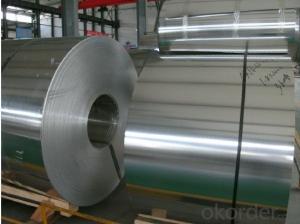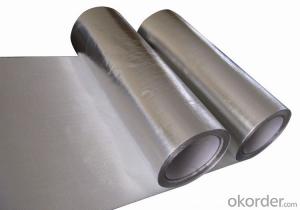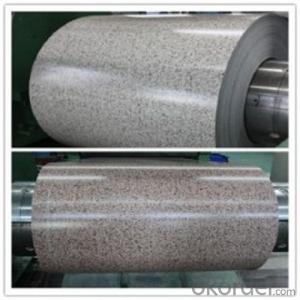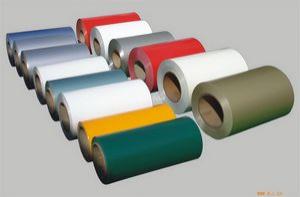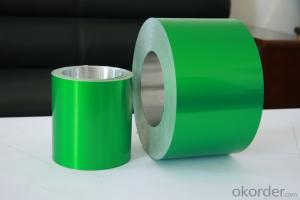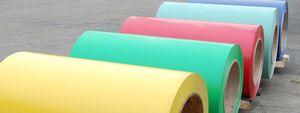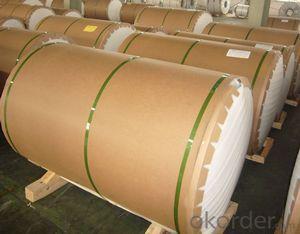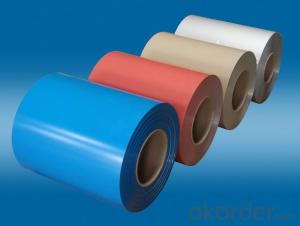Customized AA 1050 Coated Aluminum Coil
- Loading Port:
- China Main Port
- Payment Terms:
- TT OR LC
- Min Order Qty:
- -
- Supply Capability:
- -
OKorder Service Pledge
Quality Product, Order Online Tracking, Timely Delivery
OKorder Financial Service
Credit Rating, Credit Services, Credit Purchasing
You Might Also Like
supply Mill-finished / coated aluminum plate/sheet/ coil:
Alloy: AA1050,1060,1100,1200,2024,3003,3304,3005,3015,5052,5086,5754,5083,6061,7050,7475,8011, etc
Temper: O, H14/16/18/22/24/32/ H112/H321/T6,T851,T7451,T7351, etc
Thickness: 0.02mm—20mm
Width: 100mm—2000mm (Can be slitted)
Notice: PE coating / PVDF coating / Embossment can be done if required.
- Q: How to pull the aluminum coil purchased into aluminum sheet?
- You can buy flat sheet directly next time to avoid trouble.
- Q: They say aluminum can be found in deodorants.And this aluminum is absorbed by the skin and block pores.Does the amount of aluminum affect the rate of how it dries up?
- Aluminium zirconium tetrachlorohydrex gly, a common antiperspirant, Aluminum compounds or aluminum salts, such as aluminum oxide (Al2O3), are key ingredients in almost every antiperspirant. They are powerful astringents that close pores, THe aluminum is basically there to stop perspiration.They do not have an effect n how long the application take to dry. Deodorants work by keeping bacteria from growing that use the sweat for food long with skin cells that slough off.
- Q: The question asks if magnetic induction can be used to inspect the quality of an aluminum coil.
- <p>No, you cannot use magnetic induction to inspect the quality of an aluminum coil. Magnetic induction is a method used to detect flaws or discontinuities in ferromagnetic materials, such as steel, by inducing eddy currents. Aluminum is not a ferromagnetic material, so it does not retain magnetism or support the formation of eddy currents in the same way. Instead, other non-destructive testing methods like ultrasonic testing or radiographic testing may be more appropriate for inspecting the quality of aluminum coils.</p>
- Q: I know aluminum has gone up in price. I know very little about gutter material. Durability, leaf guards, etc. I am on a limited income, and need the most and best for my few bucks. Thanks Lee
- ALUMINUM!!!!!!!!!!!!!!!!!!
- Q: What are the pros and cons of utilizing aluminum coils in storage applications?
- <p>Aluminum coils offer several advantages for storage, including high durability, corrosion resistance, and lightweight properties which make them easy to handle. They are also recyclable and have good thermal conductivity, which can be beneficial in temperature-controlled environments. However, there are downsides such as higher initial costs compared to some other materials and potential for denting or damage if not properly handled. Additionally, while aluminum is generally non-magnetic, it can be attracted to strong magnets, which might be a consideration in certain storage scenarios.</p>
- Q: Can aluminum coils be used in high-pressure or high-temperature environments?
- No, aluminum coils are not suitable for high-pressure or high-temperature environments as they have lower strength and melting points compared to other materials.
- Q: What is the thickness tolerance of aluminum coils?
- The thickness tolerance of aluminum coils can vary depending on the specific grade and manufacturing process. Generally, the standard thickness tolerance for aluminum coils is around +/- 0.005 inches (+/- 0.13 mm). However, it is important to note that this tolerance can be further refined or adjusted based on the customer's specific requirements and the capabilities of the manufacturer. Some specialized aluminum coil manufacturers may offer even tighter thickness tolerances, typically around +/- 0.002 inches (+/- 0.05 mm), to meet more precise or demanding applications. It is always recommended to consult with the manufacturer or supplier to ensure the desired thickness tolerance is met for a particular project or application.
- Q: How do aluminum coils contribute to increased structural stability?
- Several factors contribute to the increased structural stability provided by aluminum coils. Firstly, the material itself, aluminum, is highly durable and possesses an excellent strength-to-weight ratio. This means that despite being lightweight, aluminum coils offer superior strength and stability, making them an ideal choice for various structural applications. Additionally, the corrosion resistance of aluminum coils is crucial for maintaining structural integrity over time. Unlike other metals, aluminum does not easily rust or deteriorate, even in harsh environmental conditions. This corrosion resistance ensures that the coils will remain structurally sound and reliable for extended periods. Moreover, aluminum coils exhibit high thermal conductivity, allowing for efficient heat transfer. This characteristic is particularly beneficial for structures exposed to temperature variations, as it facilitates the even distribution and dissipation of heat. By doing so, it prevents potential damage caused by thermal expansion or contraction. Another significant advantage of aluminum coils lies in their flexibility. Aluminum is a malleable material that can be easily bent, shaped, and formed into various configurations. This flexibility enables the coils to adapt to different structural requirements, allowing for more intricate designs and enhancing overall stability. Furthermore, aluminum is a non-combustible material, making it a safe choice for structural applications. In the event of a fire, aluminum coils will not contribute to the spread of flames, thus maintaining the integrity of the structure and ensuring the safety of occupants. In conclusion, the durability, corrosion resistance, thermal conductivity, flexibility, and fire-resistant properties of aluminum coils all contribute to increased structural stability. These characteristics make aluminum coils a reliable and efficient choice for a wide range of structural applications, providing long-lasting stability and safety.
- Q: Is it possible to use aluminum coils in the creation of toys or games for children?
- <p>Yes, aluminum coils can be used to make toys or games for children, but safety considerations must be taken into account. Aluminum is a lightweight, durable, and non-toxic material, making it suitable for various applications, including children's toys. However, it's crucial to ensure that any aluminum used in toys is properly treated to prevent sharp edges or small parts that could pose a choking hazard. Additionally, the toys or games should be designed and manufactured to meet safety standards and regulations to protect children from potential harm.</p>
- Q: What are the common fabrication techniques used for aluminum coils?
- The common fabrication techniques used for aluminum coils include rolling, annealing, slitting, and coating. Rolling is a primary fabrication technique that involves passing the aluminum through a series of rollers to reduce its thickness and achieve the desired shape. This process can be done using either hot rolling or cold rolling, depending on the specific requirements of the application. Hot rolling involves heating the aluminum to high temperatures, making it more malleable and easier to shape, while cold rolling is performed at room temperature. Annealing is another important technique used for aluminum coil fabrication. This process involves heating the aluminum to a specific temperature and then slowly cooling it down to enhance its mechanical properties. Annealing helps to relieve internal stresses, improve the aluminum's formability, and enhance its overall strength. Slitting is a technique used to cut wide aluminum coils into narrower strips. This process is typically performed using specialized machines that can slit the coils to the desired width. Slitting allows for more precise customization and can be used to produce coils of different widths to meet specific requirements. Coating is a common fabrication technique used to enhance the durability, corrosion resistance, and appearance of aluminum coils. Various coating methods, such as painting, anodizing, or powder coating, can be employed to provide a protective layer on the surface of the aluminum. This helps to prevent oxidation, improve weather resistance, and enhance aesthetic appeal. These fabrication techniques are commonly used in the aluminum industry to produce high-quality coils that can be further processed and utilized in various applications, including construction, automotive, aerospace, and electrical industries, among others.
Send your message to us
Customized AA 1050 Coated Aluminum Coil
- Loading Port:
- China Main Port
- Payment Terms:
- TT OR LC
- Min Order Qty:
- -
- Supply Capability:
- -
OKorder Service Pledge
Quality Product, Order Online Tracking, Timely Delivery
OKorder Financial Service
Credit Rating, Credit Services, Credit Purchasing
Similar products
Hot products
Hot Searches
Related keywords
